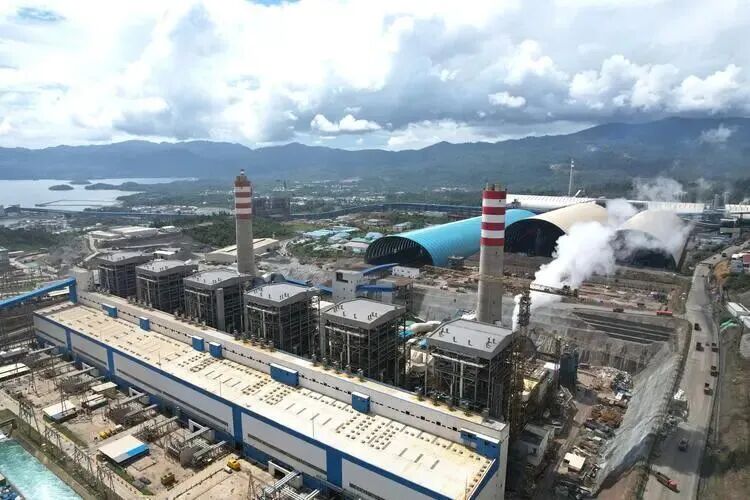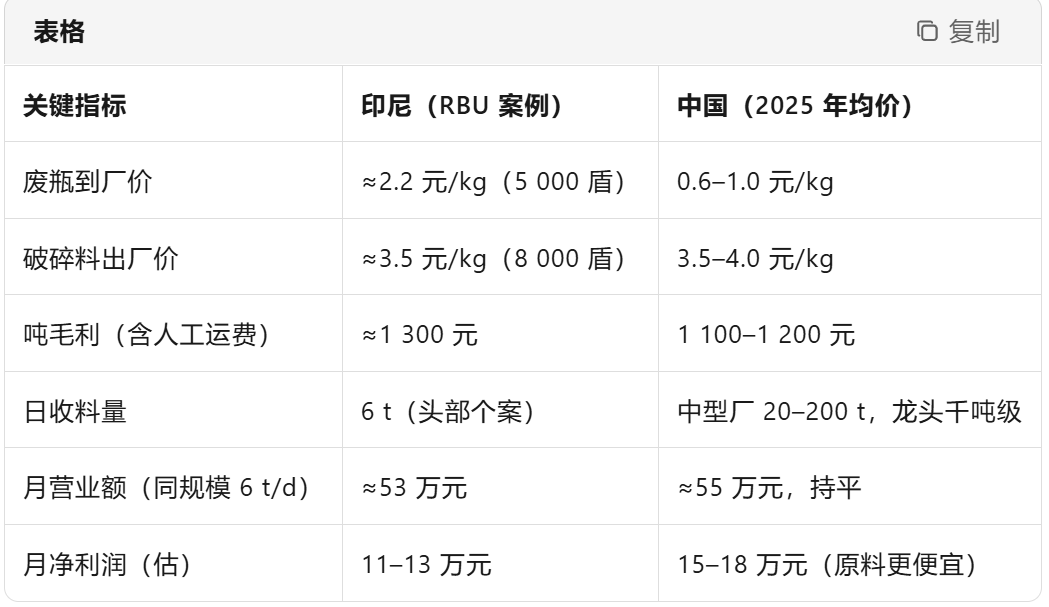Indonesian Company Earns 530,000 a Month by Collecting 6 Tons of Waste Bottles, but China Counterparts Make Even More?
On November 18, an article titled "Indonesian Waste Recycling Companies Can Earn Up to 1.2 Billion Rupiah Monthly" was published on "Daily Indonesia." Let's take a step back and compare the situations in China and Indonesia using the same criteria to see how substantial this amount of money is and how replicable it could be.
— 1 —
Indonesian waste recycling companies can earn up to 1.2 billion rupiah per month.
In Serpong, South Tangerang, Banten Province, the waste recycling cooperative "Pemulung Berdaya" (also known as the Recycle Business Unit, RBU) earns 1.2 billion rupiah per month (approximately 533,000 RMB) through the business of recycling plastic bottles.

The secretary of the cooperative introduced that they receive 6 tons of waste plastic bottles daily from surrounding areas such as Jakarta, Bogor, Depok, Tangerang, and Bekasi. The sources include waste collectors, waste banks, partner enterprises, individual scavengers, and nearby shops.
The cooperation methods are flexible, with two options: on-site collection and self-transportation. On-site collection has a weight requirement, while self-transportation has no weight limit.
The current purchase price of waste plastic bottles is approximately 5,000 dong/kg, lower than the 8,000 dong/kg in July 2025. The purchase price is determined by subtracting a fixed profit of about 3,000 dong/kg from the selling price of processed plastic bottle products. When the selling price is high, the purchase price will also increase.
From mid-2023 to mid-2025, due to donation projects from international organizations and NGOs, the purchase price of waste plastic bottles saw a significant increase, and the cooperative previously faced a shortage of raw materials due to price disadvantages.
Nowadays, the cooperative processes about five-sixths of the plastic bottles it receives into plastic flakes, while the remainder is made into plastic bales. These processed products are then sold to factories for the production of polymer yarn, geotextiles, and more, resulting in monthly profits of up to 1.2 billion dong, with a monthly turnover exceeding 1.4 billion dong (gross revenue).
— 2 —
AI Evaluation Comparison

In Indonesia, "expensive upfront, same price at the back end," resulting in slightly lower net profit per ton; in China, a vast recycling network drives raw material costs down to the lowest in the world, resulting in thicker profits.
2. Reproducibility: RBU benefits from the dual advantages of "the Greater Jakarta population of 30 million + the scarcity of local materials due to the waste ban." It is highly likely that outside or foreign entities attempting to replicate this will struggle to "secure materials or afford the prices."
3. Social Value: Against the backdrop of a national recycling rate of only 10% in Indonesia, it has incorporated over 200 scavengers into the formal chain, increasing the purchase price, which is the most valuable aspect of this case.
【Copyright and Disclaimer】The above information is collected and organized by PlastMatch. The copyright belongs to the original author. This article is reprinted for the purpose of providing more information, and it does not imply that PlastMatch endorses the views expressed in the article or guarantees its accuracy. If there are any errors in the source attribution or if your legitimate rights have been infringed, please contact us, and we will promptly correct or remove the content. If other media, websites, or individuals use the aforementioned content, they must clearly indicate the original source and origin of the work and assume legal responsibility on their own.
Most Popular
-

BASF Signs Another Giant: Covestro Already Set Up, Just Missing Wanhua Chemical?
-

DuPont plans to sell Nomex and Kevlar brands for $2 billion! Covestro Declares Force Majeure on TDI / oTDA-based / Polyether Polyol; GAC Group Enters UK Market
-

List Released! Mexico Announces 50% Tariff On 1,371 China Product Categories
-

Pop mart's half-year net profit soars by 363%! from pla to faux fur fiber, these core suppliers and material technologies are worth noting
-

Ministry Of Commerce Releases Implementation Opinions On Green Trade, Focusing On Import And Export Of Biodegradable Materials And Other Products






